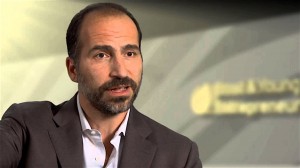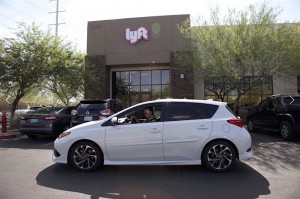
The arrival of new Uber CEO Dara Khosrowshahi hasn't stemmed the tide of potential problems for the ride-hailing company.
Those who thought Uber’s headaches would end with the ouster of its controversial CEO Travis Kalanick are going to have to think again.
New Chief Executive Dara Khosrowshahi, the former boss at travel site Expedia, has walked into a hornet’s nest that now includes at least two new, potential criminal investigations.
Ride-sharing giant Uber Technologies acknowledged late last month that it was facing a preliminary investigation by the U.S. Department of justice into the possible violation of bribery laws. Now, the Wall Street Journal reports, Uber may have used software to illegally interfere with competitors, such as Lyft, while also causing problems for drivers who wanted to work for both services.
The latter investigation is the latest to focus on Uber’s apparent use of surreptitious software to cause problems for regulators, competitors and its own drivers. Known as “Hell,” the software allowed Uber to create fake accounts to track drivers that worked for Lyft, as well as monitoring what its rival was charging for rides.
(Uber makes surprise pick for new CEO. For the story, Click Here.)

Uber is being investigated for using software to track the routes and fares of its competition, Lyft.
The FBI is also looking at whether software was also used to encourage drivers to leave Lyft and work exclusively for Uber.
Earlier this year, the New York Times revealed that the ride-sharing company had developed another surreptitious software program, dubbed Greyball, to track and avoid regulators who might try to monitor Uber’s services. The company subsequently confirmed the existence of the app, but insisted it was used “exceedingly sparingly” to protect drivers from dangerous riders.
Uber initially said Greyball was created to give the company a way to deal with customers who “violate its terms of service.” But federal investigators have been probing whether the software also allowed the company to fend off regulators, especially in areas where Uber was not officially licensed to operate but conducted business anyway. That includes Portland, Oregon.
The two investigations could prove a major challenge for new CEO Khosrowshahi, who replaced controversial Kalanick, a co-founder of Uber, who was forced out in June following a series of embarrassing gaffes and legal issues.
Even before the 48-year-old Khosrowshahi was officially named the new chief executive, Uber’s legal problems were mounting. Late last month, the ride-sharing service said it was cooperating with the Justice Department as part of a probe into whether company mangers violated laws prohibiting the bribery of foreign officials.
(Click Here for details the “size war” between Lyft and Uber.)
The case appears to center around questions of how Uber obtained the medial records of an Indian woman raped by an Uber driver in 2014. Uber may have bribed officials in order to get those records, but various news reports suggest the Justice Dept. is looking at incidents that may have occurred in other countries, as well.
During the past year, Uber has faced an embarrassing string of setbacks, including the revelation of sexual harassment of women employees that led the company to bring in former U.S. Attorney General Eric Holder to lead an internal investigation. His report was one of the factors that led to Kalanick’s ouster.
A separate lawsuit was filed by the widow of a black Uber engineer who committed suicide, allegedly due to intense workplace harassment.
Separately, Uber continues to defend itself in an ongoing lawsuit filed by Google’s autonomous vehicle spin-off. Waymo alleges a former employee who subsequently went to work for Uber stole numerous trade secrets that have been used to help the ride-sharing service develop its own self-driving vehicle technology.
(To see more about the problems at Uber that led to Travis Kalanick’s departure, Click Here.)
“Are there difficulties? Are there complexities? Are there challenges? Absolutely, but that’s also what makes it fun,” Khosrowshahi told the Bloomberg news service when his new appointment was announced.
